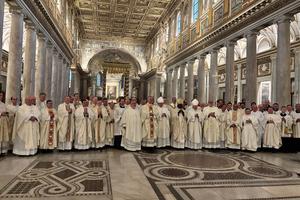Uneasy Truce: Vatican Spokesman Will Not Sue Canadian Blogger for Public Criticism
NEWS ANALYSIS: Father Thomas Rosica’s conflict with David Domet highlights the strained relationship between the Church’s hierarchy and some Catholic commentators.

TORONTO — A Canadian blogger who has been sharply critical of Pope Francis and his English-language spokesman for their perceived politically and socially liberal views will not face a lawsuit, as he had feared.
On March 4, David Domet, author of the traditionalist Vox Cantoris blog, received a threatening letter from the law firm representing Basilian Father Thomas Rosica, CEO of Canada’s Salt+Light TV and English-language spokesman for the Vatican. The letter demanded that Domet immediately and publicly retract all statements on the blog regarding Father Rosica — nine posts in all — and that he post a public apology by Feb. 22.
The Toronto law firm of Fogler Rubinoff, which offered its services at no charge, alleged that Father Rosica “is incurring and has incurred damages” as a result of “false and defamatory statements, including damages to his reputation, work and service to the Church.”
But after the letter raised concerns among Catholics about free speech, Father Rosica issued a statement explaining that he had never intended to sue and that the letter was merely a request to “cease and desist” what he called “frivolous calumny.” No lawsuit was ever launched against the blogger, Father Rosica insisted, and he indicated the matter is now closed.
The contretemps exposed the tenuous relationship between the hierarchy and some elements of the Catholic media. At issue is, first, whether a Catholic blogger (like Domet) should write in a way that is deemed by some to be inflammatory and uncharitable; and, second, whether a public official (such as Father Rosica) has the right to expect that he will not be criticized in the public square.
The Blogger
Indeed, Domet’s blog has been inflammatory. Domet opposes any discussion of change with regard to the family. He was an outspoken critic of last year’s synod on the family and has sounded an alarm in advance of the upcoming synod in fall 2015. Austin Ruse, writing at Breitbart, outlined Domet’s key concerns:
“At issue are a number of posts criticizing Rosica for his role in the unusually contentious Extraordinary Synod on the Family at the Vatican last October, which drew global attention to the debate within the Catholic hierarchy over Communion for the divorced-and-civilly remarried and the Church’s approach to homosexual unions. Some feared, and others hoped, that the Church was set to change traditional doctrine. The blog Vox Cantoris claimed that Father Rosica, who was one of the official spokesmen of the synod, was central to efforts to change at least Church practice, if not Church teaching.”
The Public Figure
The role of the media is to report, but also to analyze; and public figures such as Father Rosica should expect occasional disagreement with official positions. Cardinal Raymond Burke, who has been the subject of much media analysis, speaking this week to a reporter from LifeSiteNews, used Scripture to support his view that Catholics should not sue one another.
“Our Lord in the Gospel and St. Paul in his First Letter to the Corinthians,” Cardinal Burke said, “... instruct us not to take our disputes to the civil forum, that we should be able, as Catholics, to resolve these matters among ourselves.”
A Canadian Perspective
Breitbart noted that U.S. audiences might find the posts inflammatory and uncharitable, but not legally actionable. However, in Canada, where this case has pushed forward, the courts, in seeking to balance human rights against freedom of individual speech, may rule differently.
In one earlier case, a Canadian priest brought a lawsuit against LifeSiteNews, accusing the Canadian website of defaming him by suggesting that he did not comply with Catholic teaching on abortion. The suit remained in the courts for several years, ultimately costing LifeSiteNews more than $250,000 in legal fees; the dispute ended only when the priest died.
And Mark Steyn, Canadian-born writer and conservative political commentator, was the defendant in a “hate speech” case before Canada’s Human Rights Commission. Steyn’s offense was to publish in Maclean's magazine his views regarding the dangers of radical Islam.
Although the hate-speech law was eventually repealed, Steyn’s experience in the Canadian courts led him to write about a “climate of fear.”
Register correspondent Kathy Schiffer writes from Southfield, Michigan.
- Keywords:
- basilian fathers
- cardinal raymond burke
- catholic blogging
- father thomas rosica
- kathy schiffer
- vatican

















